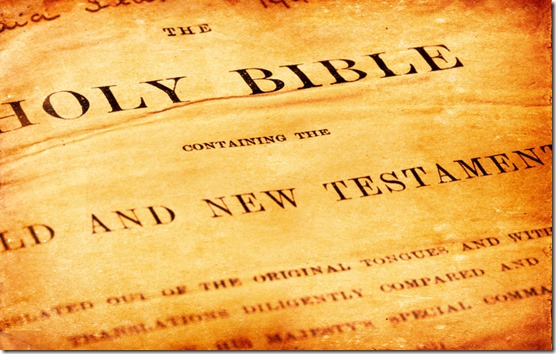
Why You Should Stop Reading the New Testament
You should stop reading the New Testament.
Just stop it.
Not forever, mind you. Just for a while. Just long enough to read the Old Testament.
Several times.
Then you can go back and read the New Testament, and when you do you’ll find that it makes a whole lot more sense.
You’ll find that some things that previously were head-scratchers now are clear. You’ll find you really just have a surface level understanding of passages that you thought you knew thoroughly. And you’ll find that passages that you once thought meant one thing actually mean something very different.
Yes, I say this as someone with a doctorate in the Old Testament, but it’s really not my Old Testament side coming through here, it’s my English major side, and that’s the side that says that reading the New Testament without a good knowledge of the Old Testament can lead you astray.
It’s not so much because we lack a good knowledge of the content of the Old Testament, although I find that to be true. It’s that we lack a thorough knowledge of the Jewishness of the Bible, both Old and New Testaments. And ancient Jews don’t think the way we do.
Our Western culture is steeped in Greek philosophy, and Western Christianity comes out of Roman Catholicism. We are trained to think like Greeks and Romans, not like Jews.
What’s the difference? Let’s put it this way: if you were to ask an ancient Greek to explain something—for instance, time—they would tell you about moon phases and how high in the sky the sun gets at different times of the year. And they would probably throw in some math.
An ancient Jew would tell you a story.
Both would get you there, so it all depends on whether you like math or you like literature.
I’m an English major. I like literature. I like stories and poems, yarns and tales.
The New Testament is written in Greek, but it isn’t a Greek book, and shouldn’t be read as a Greek book. It’s a thoroughly Jewish book from start to finish and should be read as such. But we don’t, mainly because we’ve not been taught that way.
We’ve been taught to read it like Greeks and Romans. Break it down into its component parts. Break those parts into their component parts. Do word studies. Find the logic. Understand the parts, and you’ll understand the whole.
Pfffffft.
The Jews, even when they aren’t telling a story, are telling a story. I’ve read commentaries on Paul’s epistle to the Romans that claim it’s his systematic theology—an orderly, logical explanation of Christianity.
Sorry, no.
Even though it’s a letter, it has a narrative flow, and Paul uses the logic of story, not the logic of systematic theology. Not only that, but Paul is constantly referring to stories in the Hebrew Bible, and if you don’t know the stories, you can’t follow him.
This is true of every part of the New Testament. If you want to understand the Transfiguration of Jesus then you need to know the book of Exodus. (It wouldn’t hurt to understand the story behind Hanukkah either.)
If you want to understand Peter’s dream of the sheet of food coming down from heaven and his encounter with the Roman Centurion Cornelius in Acts 10, then you better know the story of Jonah, and not just the part about being swallowed by a fish.
If you want to understand why Jesus called himself the Son of Man, you need to read the apocalyptic part of Daniel.
And if you want to really understand much of what Jesus said and did—and who doesn’t, right?—then you need to read the Psalms and Isaiah over and over and over again.
Don’t analyze them, you Greco-Roman thinker! Just read them.
Experience them.
Read them aloud so you can hear them. See the pictures they paint, and feel the feelings they portray.
Then you’ll be experiencing Scripture the way it was intended to be experienced.
So if you want to better understand the New Testament, stop reading it for a while and spend some time immersed in the stories and images of the Old Testament. When they become a part of you, the New Testament will open up for you in ways you never imagined.
Photo by © Can Stock Photo Inc. / janaka

 I am a lifelong student of the Bible, and have been a pastor for over twenty-five years. My desire through this blog is to help people see things in the intersection of Scripture and real life that they might have missed. The careless handling of the Bible is causing a lot of problems in our churches and our culture--and is literally turning people away from the church, and, sometimes, God. I hope to treat Scripture with the respect it deserves, and, even if you don't agree with what I say, give you some insight.
Feel free to leave a comment. I promise to respond to you. All I ask is that you be respectful in your comments.
I am a lifelong student of the Bible, and have been a pastor for over twenty-five years. My desire through this blog is to help people see things in the intersection of Scripture and real life that they might have missed. The careless handling of the Bible is causing a lot of problems in our churches and our culture--and is literally turning people away from the church, and, sometimes, God. I hope to treat Scripture with the respect it deserves, and, even if you don't agree with what I say, give you some insight.
Feel free to leave a comment. I promise to respond to you. All I ask is that you be respectful in your comments. 
Connect with Me